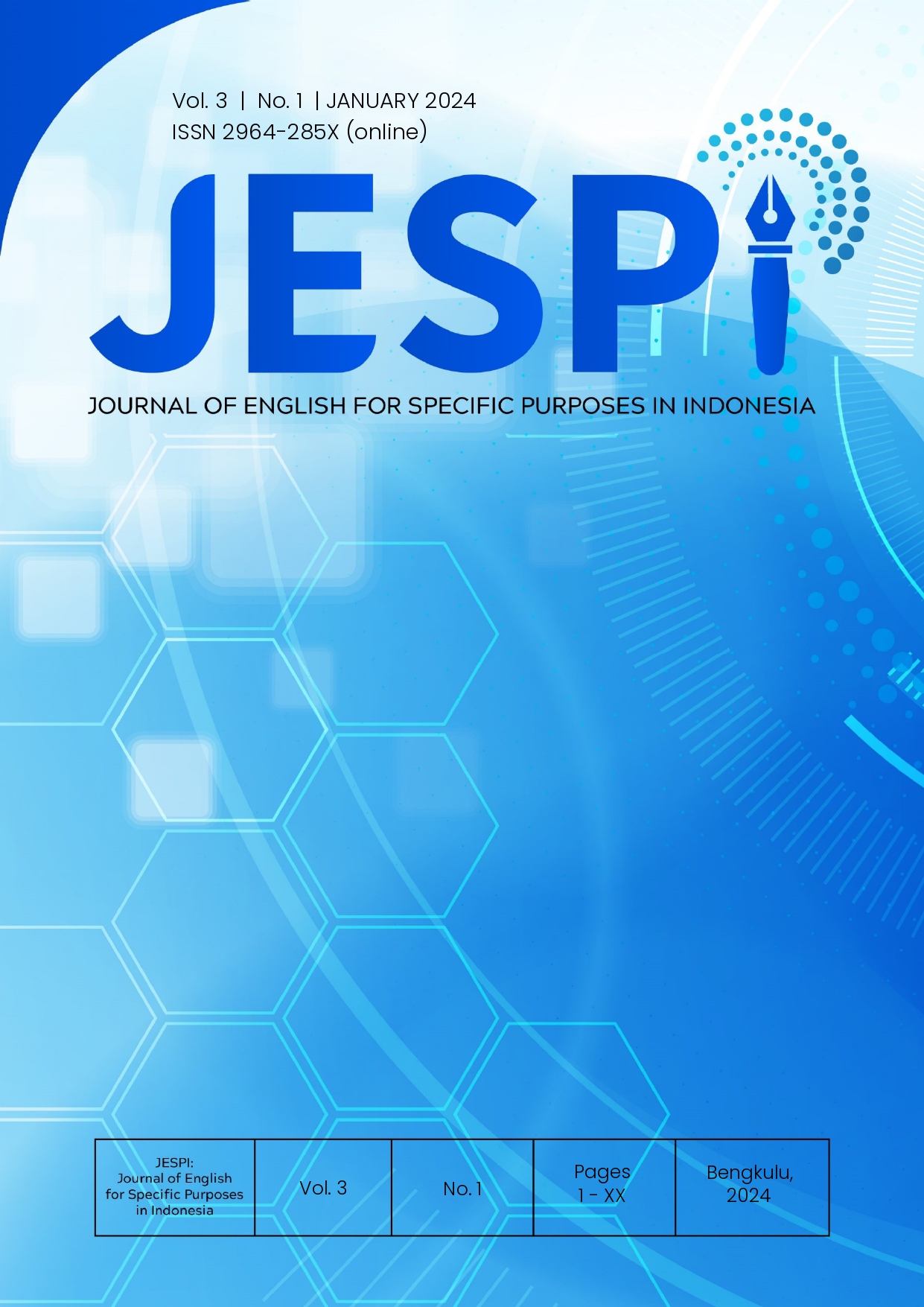Main Article Content
Abstract
This study aims to present findings focused on the analysis of figurative language and central themes in a collection of ten poems by William Blake. Qualitative research methodology is used to conduct a comprehensive analysis. Among the ten poems, the writer discovered that the predominant use of figurative language is metaphors. Furthermore, the theme explored in the poem "Ah Sunflower" pertains to the concept of life beyond death, and the theme depicted in "The Sick Rose" revolves around desire and passion, then the theme conveyed in "A Poison Tree" revolves around anger and negative emotions. In contrast, the theme depicted in "A Dream" revolves around the narrative of an individual's life. The theme explored in "A Divine Image" pertains to the portrayal of humanity. "The Tyger" revolves around religious beliefs, portraying God as powerful and magnificent. "Infant Joy" revolves around the dialogue between a child and an adult. The central idea explored in "London" revolves around portraying the daily experiences of individuals residing in London. The poem explicitly highlights Blake's dissatisfaction with the prevailing political circumstances during his existence. The central theme of "Love Secret" revolves around emotions, feelings, and the power of imagination. The primary theme of the final poem, "The Lamb," delves into matters of spirituality, mainly focusing on the grandeur of God, His creations, the presence of peace, and the quality of gentleness. The predominant theme frequently explored by the writer centered around the relationship between humanity and the divine.
Keywords
Article Details
Copyright (c) 2024 Reza Rezita Reza, Ira Maisarah

This work is licensed under a Creative Commons Attribution-ShareAlike 4.0 International License.

Ciptaan disebarluaskan di bawah Lisensi Creative Commons Atribusi-BerbagiSerupa 4.0 Internasional.
References
- Altenbernd, 1970, in Pengkajian Puisi; analisis strata norma dan analisis structural dan semiotic by Rachmat Djoko Pradopo, 2005 Fakultas Sastra Universitas Gadjah Mada.
- Auden, W.H, 1946, in An Introduction to Literature; fiction, poetry, and drama by Sylvan Barnet,Morton Berman, and William Burto, 1961, Boston; Little, Brown and Company.
- Adelina, Heidy, 2001, a thesis of Petra ,University Surabaya.
- Brooks, Cleanth, 1959, Understanding Fiction, Appleton-Century-crofts,inc
- Beaty, Jerome, Alison Booth, and J.Paul Hunter, Kelly J. Mays, 2002, The Norton Introduction to Literature ,London; W.W Norton Company, inc.
- Barnet, Silvan, Morton Berman, and William Burto, 1961, An Introduction to Literature;fiction, poetry, and drama, Boston; Little, Brown and Company
- Creswell, John W, 2003, Research Design Qualitative, Quantitative, and Mixed Method Approaches, London; Sage publications, inc.
- Coleridge, Samuel Taylor, 1997, in Literature Approaches to Fiction, Poetry, and, Drama by Robert DiYanni, 2004, New York; McGraw-hill Companies, inc.
- Creswell, John W, 2008, Educational Research; planning, conducting, and evaluating, qualitative and quantitative Research, USA; Pearson Education, inc.
- Creswell, John W, 1994, Research Design Qualitative and Quantitative Approach, London; Sage Publications, inc.
- DiYanni, Robert, 2004, Literature Approaches to Fiction, Poetry, and Drama, New York; McGraw-hill Companies, inc.
- DiYanni, Robert, 2002, Literature Reading Fiction, poetry, and Drama, New York; McGraw-Hill Companies, inc.
- Dewi, Mayasari, 2001, a thesis of Petra University Surabaya.
- Emil, and Sandra Roy, 1974, Literary Spectrum, Boston; Allyn and Bacon, inc.
- Eviyanti, 2006, a thesis of Pamulang University Tangerang.
- Markos, L. (2010). Honeydew Ethics: The Dark Side of Romantic Inspiration. Literature and Ethics: From the Green Knight to the Dark Knight, 128-44.
- Mellor, A. K. (1974). Blake's human form divine. Univ of California Press.
- Ryan, R. (2003). Blake and religion. The Cambridge Companion to William Blake, 150-168.
- Sherry, S. (2018). The language of cultural difference: figures of alterity in Canadian translation. In Rethinking Translation (pp. 159-176). Routledge
- Vallor, H. P. (1992). How Gothic influences and eidetic imagery in eight color plates and key poems by William Blake figuratively unite body and soul by dramatizing the visionary imagination.
References
Altenbernd, 1970, in Pengkajian Puisi; analisis strata norma dan analisis structural dan semiotic by Rachmat Djoko Pradopo, 2005 Fakultas Sastra Universitas Gadjah Mada.
Auden, W.H, 1946, in An Introduction to Literature; fiction, poetry, and drama by Sylvan Barnet,Morton Berman, and William Burto, 1961, Boston; Little, Brown and Company.
Adelina, Heidy, 2001, a thesis of Petra ,University Surabaya.
Brooks, Cleanth, 1959, Understanding Fiction, Appleton-Century-crofts,inc
Beaty, Jerome, Alison Booth, and J.Paul Hunter, Kelly J. Mays, 2002, The Norton Introduction to Literature ,London; W.W Norton Company, inc.
Barnet, Silvan, Morton Berman, and William Burto, 1961, An Introduction to Literature;fiction, poetry, and drama, Boston; Little, Brown and Company
Creswell, John W, 2003, Research Design Qualitative, Quantitative, and Mixed Method Approaches, London; Sage publications, inc.
Coleridge, Samuel Taylor, 1997, in Literature Approaches to Fiction, Poetry, and, Drama by Robert DiYanni, 2004, New York; McGraw-hill Companies, inc.
Creswell, John W, 2008, Educational Research; planning, conducting, and evaluating, qualitative and quantitative Research, USA; Pearson Education, inc.
Creswell, John W, 1994, Research Design Qualitative and Quantitative Approach, London; Sage Publications, inc.
DiYanni, Robert, 2004, Literature Approaches to Fiction, Poetry, and Drama, New York; McGraw-hill Companies, inc.
DiYanni, Robert, 2002, Literature Reading Fiction, poetry, and Drama, New York; McGraw-Hill Companies, inc.
Dewi, Mayasari, 2001, a thesis of Petra University Surabaya.
Emil, and Sandra Roy, 1974, Literary Spectrum, Boston; Allyn and Bacon, inc.
Eviyanti, 2006, a thesis of Pamulang University Tangerang.
Markos, L. (2010). Honeydew Ethics: The Dark Side of Romantic Inspiration. Literature and Ethics: From the Green Knight to the Dark Knight, 128-44.
Mellor, A. K. (1974). Blake's human form divine. Univ of California Press.
Ryan, R. (2003). Blake and religion. The Cambridge Companion to William Blake, 150-168.
Sherry, S. (2018). The language of cultural difference: figures of alterity in Canadian translation. In Rethinking Translation (pp. 159-176). Routledge
Vallor, H. P. (1992). How Gothic influences and eidetic imagery in eight color plates and key poems by William Blake figuratively unite body and soul by dramatizing the visionary imagination.
